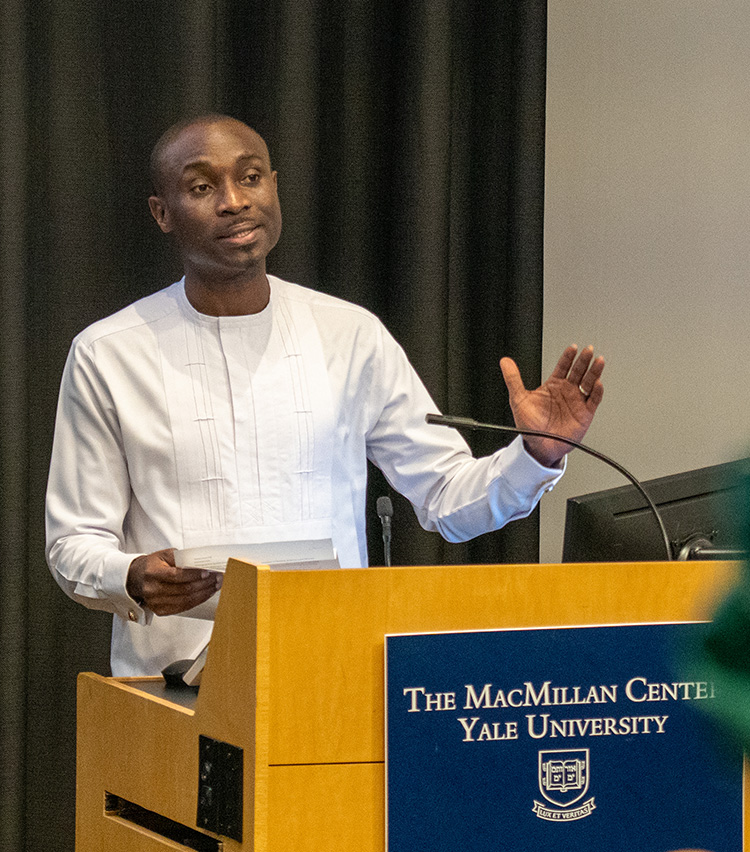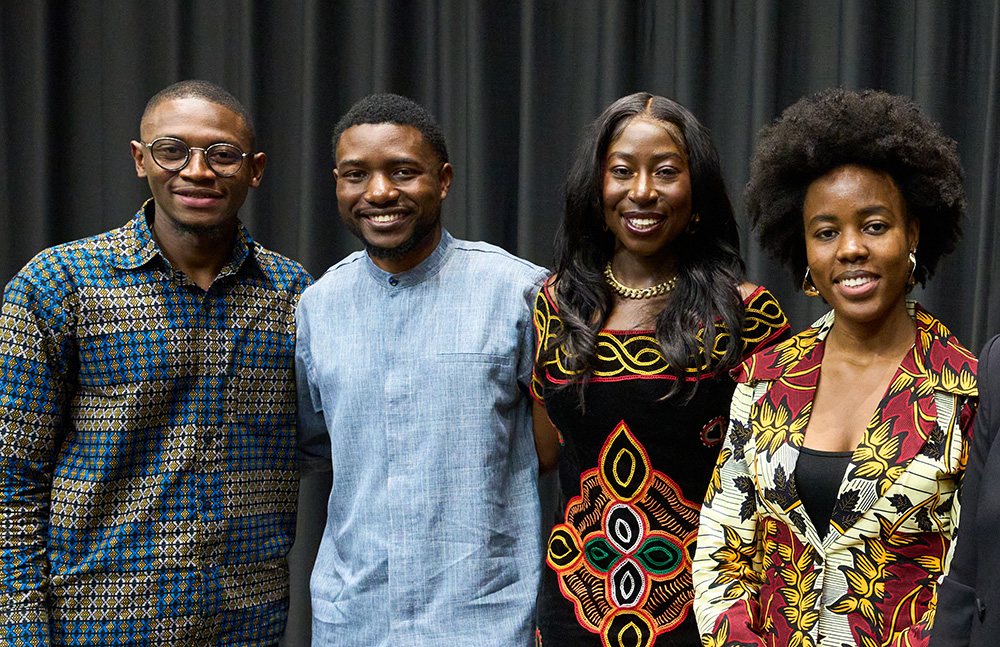Forum Promotes Leadership and Good Governance in Africa

H.E. Robie Kakonge, Ambassador of the Republic of Uganda to the United States, speaks during the Chinua Achebe Leadership in Africa Forum panel discussion on women’s leadership in Africa. Photo by Daniel Vieira.
“Introducing myself as a professor of African literature is to be confronted with a smile and an admission that my interlocutor had read Things Fall Apart,” Cajetan Iheka told his audience on November 15. The professor of English at Yale, who is also Nigerian, explained that the late literary giant Chinua Achebe’s global renown has paved the way for Iheka’s own recognition and reception around the world. But, Iheka argued, Achebe was more than a global ambassador and writer; he was “a diagnostician of the Africa problem, a prophet of uncommon distinction, a theoretician of political power, a liberation theologist, and a moral philosopher.”
 By Daniel Vieira
By Daniel Vieira
Cajetan Iheka offers welcoming remarks.
Iheka, who is also Chair of the Council on African Studies at the MacMillan Center, Director of the Whitney Humanities Center, and Head of the Africa Initiative at Yale, organized November’s Chinua Achebe Leadership in Africa Forum with the late Achebe’s family to explore the problem of leadership and good governance on the African continent. With panelists and attendees joining from across Yale and across the continent, this—and other recent events—exemplified Yale University’s unparalleled opportunities to study Africa and its commitment to supporting African leaders in their pursuit of good governance.
“Africa is the world’s future, so the problem of leadership there is an existential one that affects all of us,” said Cajetan Iheka. “It is thus important and gratifying to see the Council on African Studies and the MacMillan Center curating conversations and supporting research on leadership across the continent. These activities are quite costly both in terms of labor and finance, but the urgency of the subject matter makes the expenditure worthwhile.”
Panel discussion topics included leadership and democracy in Africa, subnational governance, women in leadership, and young people and the future of leadership in Africa.
Kate Baldwin, associate professor of political science and global affairs at Yale, moderated the discussion on Leadership and Democracy in Africa, whose panelists included Peter Obi, a presidential candidate in Nigeria’s last election and former governor of Anambra, Achebe’s home state; Oby Ezekwesili, a former minister in Nigeria and President of Human Capital Africa; Seleshi Bekele Awulachew, a minister in the Ethiopian government; and MacMillan Center visiting associate professor Rawia Tawfik Amer from Cairo University.

The Leadership and Democracy in Africa panel discussion, moderated by Professor Kate Baldwin (at far right). Photo by Daniel Vieira.
“This is the kind of event that makes teaching and studying at Yale so special,” Baldwin said. “As a scholar of African politics, it was a thrill to moderate a candid discussion among reform-minded leaders from Africa’s three largest countries.”
For the political science students who attended, Baldwin added, the debates among these leaders about the role of political institutions, economic development, and civic education in promoting democracy on the continent highlighted the real-world implications of their classroom discussions.
Other distinguished panelists included Bisa Williams, a retired United States ambassador who worked in Africa and is now a senior fellow at the Jackson School of Global Affairs, and Robie Kakonge, Ugandan Ambassador to the United States. Achebe’s wife, Professor Christie Achebe, and their children were in attendance and contributed to the robust discussions, and former Nigerian President Oluṣẹgun Ọbasanjọ delivered the forum’s keynote address remotely.
 Photo By Joe Faraoni
Photo By Joe Faraoni
Yale student panelists pose after the intergenerational panel discussion.
In addition to several Yale faculty participants, current Yale students contributed their voices to the forum’s programming, including current undergrads Abraham Keita ’25, Georgette Nyiraneza ’25, and Abi Ndikum ’25, and master’s students Faith Chumo ’21 (’25 MPH candidate) and Didace Irafasha (’25 MPP candidate), many of whom participated in the intergenerational panel that put current and future leaders together in conversation.
Iheka spoke glowingly of them, saying, “Our students are bright lights of their generation and African leaders in their own right.”
Despite the sobering topics covered in the conference, including the coups, civil wars, and political instability of various countries on the continent, Iheka said, “It is morning yet on creation day,” referring to the title of a collection of fifteen essays written by Chinua Achebe between I96I and I974. “I invoke that famous title of his in recognition of the possibility of redemption, in acknowledgement of the hopeful promise of our great continent.”

Amarachi Ammatah performs the praise poem Ode to Africa at the Chinua Achebe Forum.
View the Leadership in Africa Forum photo gallery.
Related event: View the “30 Years of Democracy in South Africa” photo gallery.
Our thanks to Cristin Siebert and Rita Offiaeli, the Council on African Studies’ staff, for contributing to the success of the Leadership in Africa Forum and other events.
- Humanity
- Good Governance